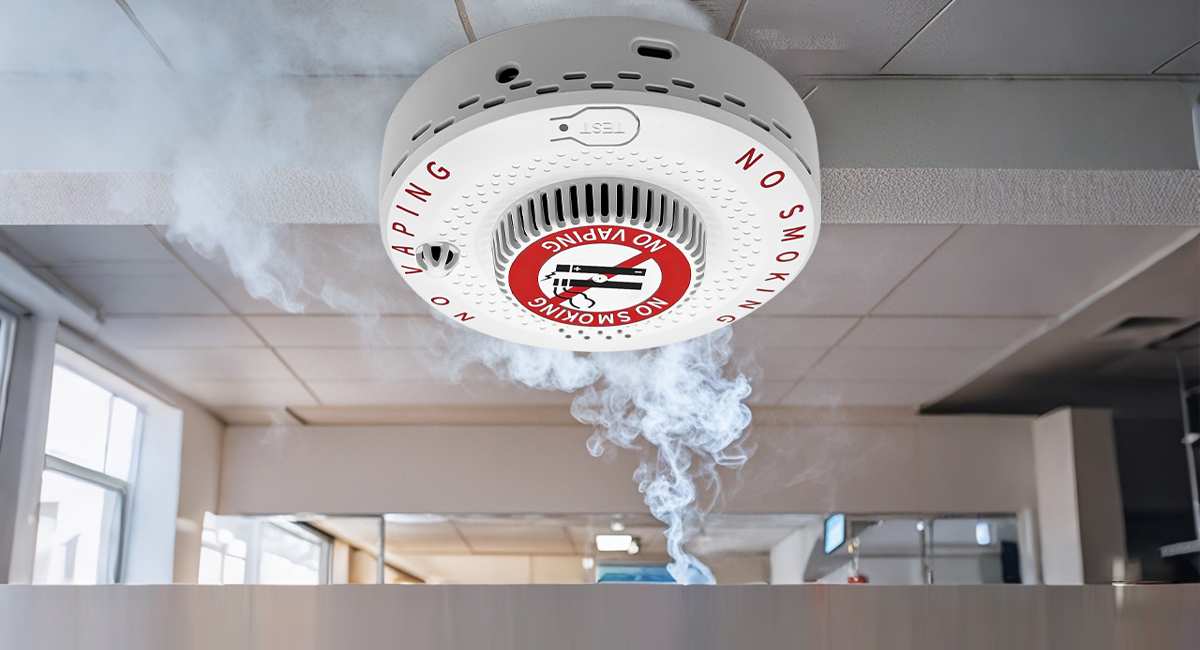With the increasing popularity of vaping, a new question has emerged for building managers, school administrators, and even concerned individuals: Can vaping trigger traditional smoke alarms? As electronic cigarettes gain widespread use, especially among younger people, there is growing confusion around whether vaping can set off the same alarms designed to detect tobacco smoke. The answer isn't as straightforward as one might think.

How Smoke Alarms Work
Traditional smoke detectors are typically designed to sense the particles and gases released by burning materials, such as tobacco. They use various technologies like ionization or photoelectric sensors to detect smoke, flames, or heat. When particles from combustion are detected, the alarm is triggered to warn of a potential fire.
However, e-cigarettes work differently. Instead of producing smoke, they create vapor through a process called aerosolization, where a liquid—often containing nicotine and flavorings—is heated to produce a mist. This vapor doesn't have the same density or characteristics as tobacco smoke, which presents a challenge for conventional smoke detectors.
Can Vaping Set Off a Smoke Alarm ?
In some cases, yes, but it depends on the type of detector and the volume of vapor produced. While the aerosol from vaping is less likely to trigger an alarm than traditional smoke, in certain situations—such as heavy vaping in an enclosed space—it can still happen. Photoelectric smoke alarms, which detect larger particles, may be more prone to picking up on vapor clouds. Conversely, ionization alarms, which are more sensitive to smaller particles from flames, are less likely to be affected by vaping.
Growing Need for Vaping Detectors
With the rise of e-cigarette use in schools, offices, and public places, building administrators face new challenges in maintaining smoke-free environments. Traditional smoke detectors were never designed with vaping in mind, which means they may not always provide the intended protection. To address this gap, a new generation of vape detectors has emerged, specifically designed to sense the vapor from electronic cigarettes.
Vape detectors work by identifying specific chemical compounds or particles unique to e-cigarette vapor. These devices offer a much-needed solution for schools that want to prevent students from vaping in restrooms, for companies aiming to maintain a smoke-free workplace, and for public facilities looking to enforce vaping bans.
Why Vape Detectors Are the Future
As vaping becomes more prevalent, the demand for vape detection systems will likely grow. Many public health officials are concerned about the health risks associated with secondhand e-cigarette vapor, and vape detectors could play a critical role in ensuring that indoor air quality remains uncompromised.
In addition, the introduction of these detectors represents a step forward in the evolution of building safety and air quality management. As schools, airports, and other public spaces increasingly look for ways to enforce their no-smoking policies, vape detectors could soon become as essential as smoke alarms.
Conclusion
While vaping might not always trigger a traditional smoke alarm, it does present new challenges for enforcing smoke-free policies in public spaces. The emergence of vape detectors provides a timely and effective solution to this problem. As the vaping trend continues, it's likely that more buildings will adopt this technology to ensure a clean and healthy environment for all.
As technology advances, building managers and public facilities need to stay ahead of trends like vaping to ensure that their safety systems are equipped to handle modern challenges.
Post time: Sep-26-2024











